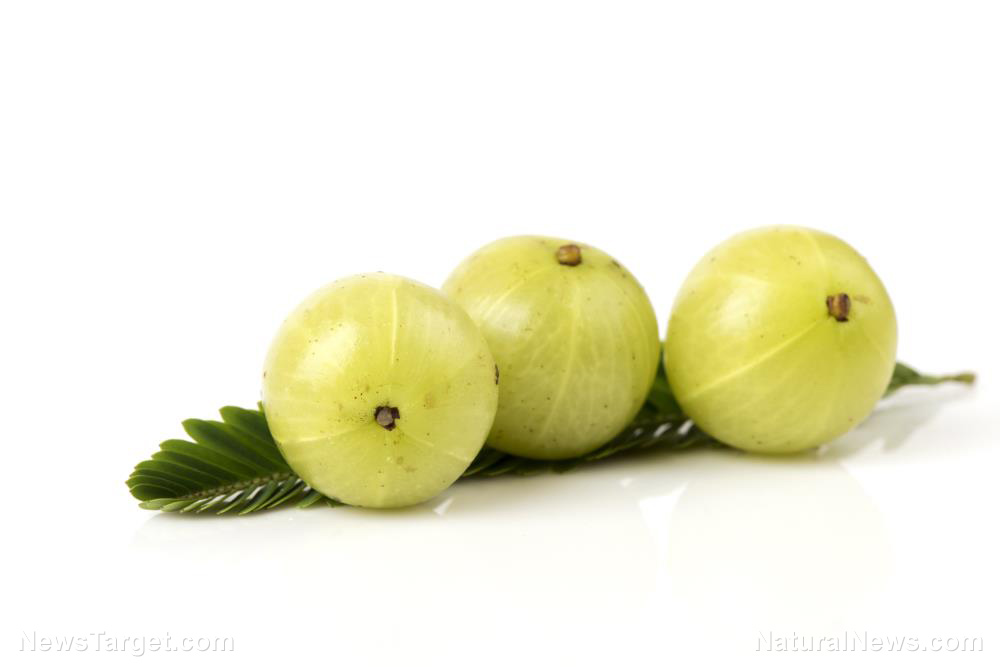Manage your cholesterol levels with Indian gooseberry
04/19/2019 / By Michelle Simmons

Researchers found another medicinal plant that can help lower your cholesterol and triglyceride levels: the Indian gooseberry (Emblica officinalis), also known as amla. The researchers conducted a study to examine the efficacy of the Indian gooseberry in individuals with dyslipidemia, or abnormal lipid levels.
For this purpose, the Indian researchers recruited 98 participants and divided them into treatment and placebo groups. Participants in the treatment group received 500 milligrams (mg) of the Indian gooseberry extract, while the other group received a placebo capsule. The extract and placebo were given twice every day for 12 weeks. The researchers measured the lipid profiles of the participants. They also assessed the effect of the Indian gooseberry extract on other markers of cardiovascular disease, as well as fasting blood glucose and coenzyme Q10 (CoQ10).
Published in the journal BMC Complementary and Alternative Medicine, the results revealed that those who received the Indian gooseberry extract experienced significant reductions in their levels of total cholesterol, triglycerides, low-density lipoprotein (LDL) cholesterol, and very low-density lipoprotein (VLDL) cholesterol. In addition, the Indian gooseberry extract reduced the markers of cardiovascular disease.
The researchers also observed a general trend of fasting blood glucose reduction, suggesting a potential hypoglycemic effect. An additional benefit of the use of the Indian gooseberry extract over other conventional treatments is the lack of change in CoQ10 levels, which act as antioxidants. Statin drugs, for example, can reduce CoQ10 levels.
Based on these findings, the researchers concluded that Indian gooseberry is a safe and effective way to treat dyslipidemia and improve cardiovascular health. It can also be used as an alternative to statin drugs.
Indian gooseberry extracts fight inflammation and improve blood flow
A study published in the British Journal of Nutrition reported that extracts from the Indian gooseberry may be used in fighting inflammation and preventing blood clot formation. Researchers from Japan reported that Indian gooseberry extracts are rich in polyphenols and have anti-inflammatory and anticoagulant properties.
In this study, the Japanese researchers examined the extract in cell trials. They exposed human endothelial cells to lipopolysaccharide, which triggers an inflammatory response from cells. The endothelium is the thin layer of cells lining the blood vessels. It plays a role in many functions, such as maintaining the suppleness of blood vessels and regulating the activity of neutrophils, which are white blood cells that form an important part of the immune system. When the endothelium fails to function well, the arteries became less supple, increasing the risk of high blood pressure, and inflamed, resulting in an overabundance of adhesion molecules. Results of the cell trial revealed that the treatment with the Indian gooseberry extract substantially reduced the expression of factors associated with blood clot formation.
The researchers also tested the effect of the Indian gooseberry extract in rats, which were treated with 50 mg per kilogram (mg/kg) body weight of the extract. Results showed that the extract significantly reduced pro-inflammatory cytokines, tumor necrosis factor-alpha (TNF-alpha) and interleukin-6 (IL-6).
The Indian gooseberry is one of the most important medicinal plants in Ayurveda. It is traditionally used for improving digestive health, cardiovascular health, eye health, and relieving cough and throat inflammation. This medicinal plant is also rich in vitamin C, minerals, tannins, fibers, proteins, and amino acids. (Related: The Indian gooseberry and chameleon plant contain compounds that kill cancer cells.)
Read more stories and studies on the health benefits of the Indian gooseberry by going to NaturalCures.news.
Sources include:
Submit a correction >>
Tagged Under:
This article may contain statements that reflect the opinion of the author
RECENT NEWS & ARTICLES
COPYRIGHT © 2017 SUPER FOODS NEWS





















